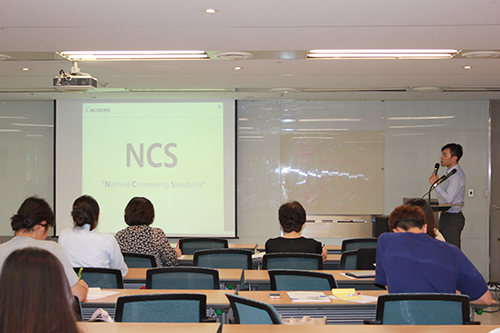 | ||
| ▲ The head Kim Soon-ho is doing a presentation about NCS at the briefing session held by Seoul Regional Ministry of Employment and Labor. | ||
| /Photograph by Lim Ji-soo | ||
Appeared to reduce mismatch between employees and employers
Korean society has recruited people based on their educational backgrounds. Nonetheless, it is diagnosed that they cannot fulfill their role properly without “competence,” a specific ability needed in the field that they are working in. “The job seekers become to spend too much time and energy in studying things that do not have relevance with the actual work. Similarly, the employers go through trouble as the workers cannot perform the work,” said Choi Young-hoon, the CEO of HPC Consulting. Hence, NCS-based recruitment is to minimize the mismatch between the actual working skills of employees and the expectation of employers. Last year, NCS was adopted in 130 public enterprises and public organizations. This year, it is expected to be applied in 230 public corporations and in all 316 public places next year, in 2017. Some private enterprises have similar systems as Samsung, SK, IBK, and Lotte have introduced “Evaluation System for Job Fitness,” though not exactly the same as NCS.
Practical abilities needed in actual work field are emphasized
In a large scheme, there are two evaluation factors in NCS-based recruitment, Core Competency and Job-performing Competency. Core Competency requires general fundamentals like organization manners. It is evaluated through ten areas: Communication Skill, Mathematical Skill, Problem Solving Skill, and others. “The word ‘effective’ is the keyword in this evaluation. Enterprises want you to communicate with others effectively,” said Kim Soon-ho, the head of the Competence Development Research Department at the Korean Institute for Research in the Behavioral Sciences. Next, Job-performing Competency expects specialized fundamentals, which take more time to study as they require professionalism.
There is no space to put one’s picture and write the name of one’s affiliated university in any document, written and spoken examinations. Instead, applicants have to write the contents of the education they received, directly related to the field that one applied to. Jeong Da-won (21), a participant in a briefing session about NCS held by Seoul Regional Ministry of Employment and Labor on August 10th, 2016, said that she likes the fact that competency is evaluated above all and that standards are clearly given.
The burden of employment stays unsolved
Despite the fact that one of the aims of NCS-based recruitment is to reduce the burden that job seekers have, many disagreed. According to a survey conducted by Saram-in, an online job-search site, targeting university students and job seekers, 70.2 percent of 1,492 people said that NCS-based recruitment has increased the burden of getting a job. “I am positive about NCS. Still, I have to be ready for everything anyway,” commented Choi Yun-seon, another participant in a NCS briefing session.
In reality, the private education market is being created in respect of NCS-based recruitment. Private educational institutes related to employment such as Hackers-job and Sidae-edu have launched classes for NCS-based tests worth three to five hundred thousand won on average. An Yoon-jung, a professor at Dharma College in Dongguk University, said, “Currently, there are not enough experts in the field of NCS and it will take a long time to develop examinations where NCS is properly applied. If only the format of NCS is adopted, the job seekers will have to prepare even more things.”
Only has been adopted in public enterprises
Another problem arises as NCS-based recruitment has only been adopted in public enterprises so far. Although the government is trying to extend its adoption to private enterprises, the reality is not getting better. A report “Recruitment System Based on Competence for Employment Extension among Rising Generation,” announced by Korea Research Institute for Vocational Education and Training, showed that eight out of ten private enterprises have no plan to adopt NCS-based recruitment. Jeong Da-won noted, “NCS will have to be adopted in general including private businesses to reduce our burden.” To this matter, Head Choi said that NCS is being adopted mainly in public enterprises not because it is more appropriate for them than private ones, but because public enterprises have a higher tendency to adapt to government policies.
Yet unripe, but has positive potential inside
It is expected that NCS would bring a significant influence to the job field. In spite of its original purpose to build a competence-oriented society, possible drawbacks cannot be ignored. Head Choi explained that customization of standardized NCS data are essential on the basis of the size, type and roles in each enterprise. Yet, it should go more than that: customizing the data that fit each enterprise through a systemized job analysis. He mentioned, “If it becomes successful, NCS would become a treasure house.” Professor An also commented that it is likely that stories of a new paradigm will be reported with alleviated academic cliques as long as the enterprises and the government apply NCS on an overall basis.

